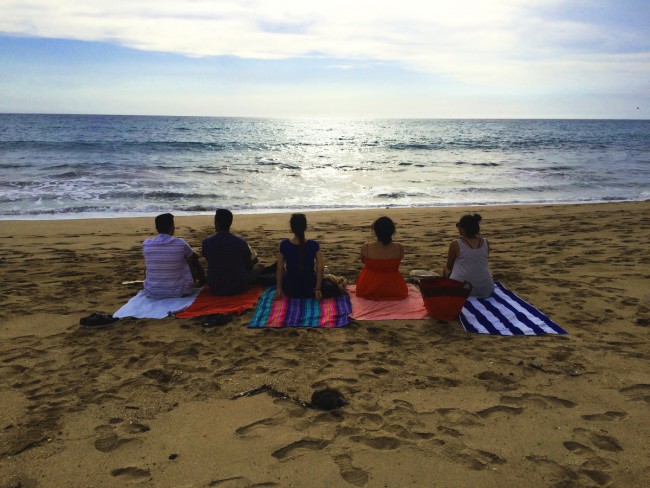In his book, “Mexico and Mexicans, Cracking the Cultural Code, “author Ned Crouch tells an amusing anecdote that I have heard in many forms in my research and conversations since I moved part-time to Mexico last year.
A stressed-out American decides to goes to the beach. The beach is vacant and he eagerly looks forward to a peaceful interlude, nothing but the sound of the surf and the sight of the silvery waves.
He has only just laid his beach towel down and out of nowhere comes a Mexican family – children, grandmother, parents and teenagers who arrive and park themselves right beside him on this otherwise empty stretch of beach. What just happened?
According to Crouch, who has impressive credentials as the son of a diplomat and as a businessman in Mexico for many years, Mexicans have a very different sense of space than we Anglo-Saxons do.
Children do not have their own rooms. People like small spaces for parties. The personal distance is four-six inches less when you meet someone. Where we draw a circle around the individual, Mexicans draw it around the group.
I go to a gym here in Mazatlan many days, a two-story, old-school largely free-weight affair, often packed. One sweltering evening, I noticed how close the guys were, working out within only a few feet of each other, yet totally comfortable and oblivious to the heat and motion of another man curling a 30 pound dumbbell a foot from their face.
Mexico is a warm country of low voices, soft vowels and close languid movement. The difference is part of what makes Mexico infinitely more calming once you manage to stop swimming upstream against its current of social intimacy. It’s hard to get used to at first.
In the Sci-fi movie “I Robot” there is a scene in which a hundred robots are huddled together in a storage unit, their eyes fearful and yet human, seeking comfort in the proximity of their kind. The fact that they are robots makes the scene even more poignant, they are so mechanized and still so human.
Maybe we are moved because we recognize ourselves in them, robots carefully constructing barriers in our lives and relationships only to realize that what we really want is to huddle.
The customary kissing cheeks with my Mexican girlfriends still feels a little uncomfortable. What am I so afraid of? Westerners have learned to physically distance ourselves at a great cost, sacrificing the simple intimacy of a shared park bench or sitting on the same side of the table with a friend for something deemed safer.
I often take a water taxi across the bay to catch cabs or buses to El Centro, the southern most historic district of Mazatlan. The water taxi is pretty large and has bench seats on each side that can accommodate probably 15 people.
Lately when I board, I have nonchalantly walked over and seated myself right next to other passengers, even when I could seat myself further away, or even seat myself next to another lone passenger on the ferry. They never even notice but it does unexpectedly make me feel more at peace.
I have taken these lessons, applied them to my life in Denver, and found that a gentle touch on the shoulder of a listener, a request to sit on the same side of the table as a good friend or even leaning in just a few inches closer in a conversation can add precious moments of connectivity. Moments we need every day.
Guest Author Bio
Kerry Baker
 Kerry Baker is a partner with Ventanas Mexico in Mazatlán, Mexico, which helps women explore living full or part time in Mexico. She has written for Forbes, Huffington Post and Boomer Café.
Kerry Baker is a partner with Ventanas Mexico in Mazatlán, Mexico, which helps women explore living full or part time in Mexico. She has written for Forbes, Huffington Post and Boomer Café.
Blog / Website: http://ventanasmexico.com
Recent Guest Author Articles:
- How Strong Business Training Translates Into Everyday Decision-Making
- New Career and Degree Paths for Educators Who Want to Make a Broader Impact
- Finding the Right Plumber in Portland: A Comprehensive Guide for Homeowners
- Why Choose Elara Caring for Jackson, MI Home Health Services?
- How I Turned Poetry into a Paycheck



Please Share Your Thoughts - Leave A Comment!